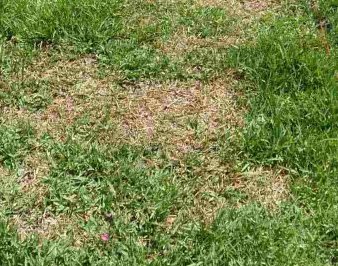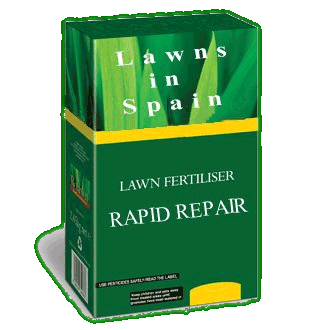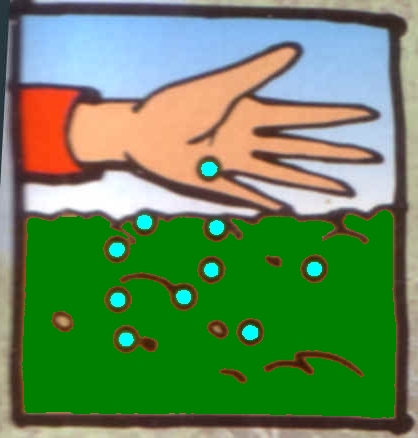Lawn Fertilizer
 |
Fertilizing a lawn is required whatever type of grass you have. But applying a general purpose lawn fertilizer is often not the solution. Different grasses need different fertilisers. For example some lawn grasses need more Nitrogen, others need more Iron. But certainly more fertilizer applied to an already saturated and high pH soil is a waste of money. |

Try our "Rapid Repair" Fertilizer - spectacular results in 7 days |
|
Not all fertilizers are suitable for lawns. Some are too strong and burn the lawn. |
|
Warning !
Just because its a general purpose lawn fertiliser, does not mean its the right type for your grass. The easy route can often cost you or waste your money. Above is a good example. At first it was thought that there was fungus or insect damage, but it turned out that the wrong type of fertilizer had been applied.
| Fact: With our new underground irrigation system, you can fertilise your lawn and water it at the same time. |
The problem with fertiliser is most people only think of fertilising their lawn when they have a problem with it. That's when the wrong choice of fertiliser for a sick lawn can have the opposite effect. |
Choose the right fertiliser product including feed and weed for your type of grass from our Lawns in Spain fertiliser product range.
If you have already applied lawn fertilizer with no visible effect, then here are some Summer and Winter Fertiliser tips...![]()
During the winter with cool season grasses,
the Lawns in Spain winter fertilizer should be applied every 4 - 6
weeks after cutting.
If you have a warm season lawn, then
the last lawn feed of Lawns in Spain Summer fertiliser should be late August or September. i.e Just
before the grass goes dormant.
During the Summer, the cool season grasses in your lawn will be struggling or
even dead, but your warm season grass will require feeding around once every two
months.
Apply fertiliser in the
evening and water in. Do not apply fertiliser if there is the
possibility of heavy rain, which may wash the fertiliser away.
It is always difficult to gauge the frequency of feeding, but it's a
little like watering, what you do will depend on what your lawn
looks like.
Hide this content.

We recommend "Lawns in Spain" summer or winter fertiliser mix is applied at 1 - 2 Kilos per 100M2. However because there is such a wide range of fertilisers and strengths, you may be applying a general purpose fertiliser to your lawn with no visible affect. This is wasteful and costly as at the wrong rate, more fertiliser will ultimately need to be applied.
Equally there are fertilisers that are so strong that at 1 - 2 Kilos /100M2 they burn and kill the lawn.
We have tested all our fertiliser mixes and guarantee that they are safe and will produce spectacular results.
In general, winter fertilizers tend to encourage root growth, whereas summer fertilizers concentrate on leaf growth, photosynthesis and leaf colour.
We have a range of fertilizers
of different strengths and compositions suitable for most lawn grasses and different seasons
See
our products page.
Details can also be supplied in our Customised Lawn Repair Project. ![]()
List of
the 6 Fertilizer
Macronutrients...![]()
Nitrogen is a part of all living cells and is a necessary part of all proteins, enzymes and metabolic processes involved in the synthesis and transfer of energy.
Nitrogen is a part of chlorophyll, the green pigment of the plant that is responsible for photosynthesis.
Helps plants with rapid growth, increasing seed and fruit production and improving the quality of leaf and forage crops.
Nitrogen often comes from fertilizer application and from the air (legumes get their N from the atmosphere, water or rainfall contributes very little nitrogen)
Phosphorus (P)
Like nitrogen, phosphorus (P) is an essential part of the process of photosynthesis.
Involved in the formation of all oils, sugars, starches, etc.
Helps with the transformation of solar energy into chemical energy; proper plant maturation; withstanding stress.
Effects rapid growth.
Encourages blooming and root growth.
Phosphorus often comes from fertilizer, bone meal, and superphosphate.
Potassium (K)
Potassium is absorbed by plants in larger amounts than any other mineral element except nitrogen and, in some cases, calcium.
Helps in the building of protein, photosynthesis, fruit quality and reduction of diseases.
Potassium is supplied to plants by soil minerals, organic materials, and fertilizer.
Calcium (Ca)
Calcium, an essential part of plant cell wall structure, provides for normal transport and retention of other elements as well as strength in the plant. It is also thought to counteract the effect of alkali salts and organic acids within a plant.
Sources of calcium are dolomitic lime, gypsum, and superphosphate.
Magnesium (Mg)
Magnesium is part of the chlorophyll in all green plants and essential for photosynthesis. It also helps activate many plant enzymes needed for growth.
Soil minerals, organic material, fertilizers, and dolomitic limestone are sources of magnesium for plants.
Sulphur (S)
Essential plant food for production of protein.
Promotes activity and development of enzymes and vitamins.
Helps in chlorophyll formation.
Improves root growth and seed production.
Helps with vigorous plant growth and resistance to cold.
Sulphur may be supplied to the soil from rainwater. It is also added in some fertilizers as an impurity, especially the lower grade fertilizers. The use of gypsum also increases soil sulphur levels. Hide this content.



